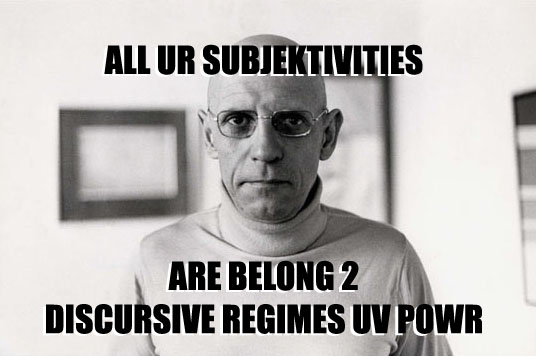At my job I am housed in a building occupied mostly by social science and humanities scholars, many of whom are postmodern, post-structuralist, “critical” social theory oriented. The “critical” is in quotes not to cast aspersions, but because these folks use the term somewhat differently than do scientists, for whom all well-conceived legitimate work is critical in the sense of skepticism, testability, and the potential for falsification. Anyway, my office location ensures that I am exposed to a good deal of the concepts and jargon of that community.
One of those is metanarrative. According to the Sociology Index web site:
Metanarrative is a story, narrative or theory which claims to be above the ordinary or local accounts of social life. Postmodernists claim that the majority of the writings of Karl Marx, David Emile Durkheim and Max Weber are offered as metanarratives, presented as capturing universal properties of social life and thus superior to local or more grounded stories. Postmodernist social theorists argue for a return to the local, the rejection of grand theory and a privileged position for science and its narratives, and an acknowledgment of the inherently political nature of all narratives. (http://sociologyindex.com/metanarrative.htm)
Some within the social science/humanities community argue that the pomos themselves construct metanarratives (for example of science) in their arguments. Notwithstanding that, I got to wondering about the metanarratives of the Earth and environmental sciences.

Hey, hope I'm not offending anyone . . . :)
Actual use and definitions of the term metanarrative seem to be confined to the “critical” social sciences and humanities, but if we think of them as narratives about narratives, or overarching stories that encompass or circumscribe individual stories, the idea is certainly applicable to the geosciences. Plate tectonics, evolution by means of natural selection, steady-state equilibrium, and balance-of-nature are all examples of metanarratives used (for good or ill) in Earth and environmental sciences.
Pomos, as best I can tell, don’t like metanarratives because:
1. They obscure or distort important local, case-specific aspects (not necessarily just details).
2. They are not universally applicable and do not explain everything within their domains.
The first critique is entirely applicable to geoscience metanarratives, though this doesn’t necessarily make the metanarratives wrong or useless. The second item, while undoubtedly true, is not a good reason for rejecting metanarratives. For example, the conservation laws for energy and mass are universally applicable (arguably THE only laws that absolutely must apply everywhere and always), but even in problems of say, sediment transport or fluid dynamics they don’t always explain everything. That fact does not deny the truth or diminish the utility of the conservation laws.

You have to be at least two different kinds of nerd to get this joke ( photo: https://unstruck.wordpress.com)
This discussion is continued in part II, next blog entry.
